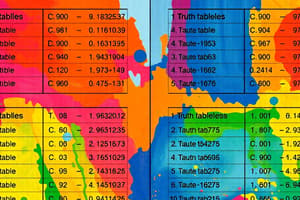Podcast
Questions and Answers
What is a tautology in logic?
What is a tautology in logic?
- A statement that is always false, regardless of the truth values of its individual components
- A statement that is always true, regardless of the truth values of its individual components (correct)
- A statement that is sometimes true and sometimes false
- A statement that is only true in specific scenarios
Which statement demonstrates material equivalence?
Which statement demonstrates material equivalence?
- The sky is blue or it's not blue
- Earth is larger than its satellite Moon (correct)
- A rose is a rose is a rose
- New Delhi is the capital of Bharat
In logical equivalence, which statements are considered logically equivalent?
In logical equivalence, which statements are considered logically equivalent?
- "It is not sunny today." and "The weather is cloudy today." (correct)
- "The sky is blue or it's not blue" and "If I eat pizza, then I've eaten pizza"
- "A rose is a rose is a rose" and "If I eat pizza, then I've eaten pizza"
- "The sky is blue or it's not blue" and "The weather is cloudy today."
What does 'tautology' imply about the truth values of a statement?
What does 'tautology' imply about the truth values of a statement?
What distinguishes a tautology from other statements in logic?
What distinguishes a tautology from other statements in logic?
What is the truth value of a biconditional statement?
What is the truth value of a biconditional statement?
In logic, when is a negation true?
In logic, when is a negation true?
What do logically equivalent statements convey?
What do logically equivalent statements convey?
When are both statements in a given pair said to be logically equivalent?
When are both statements in a given pair said to be logically equivalent?
What does the biconditional 'If and only if' represent?
What does the biconditional 'If and only if' represent?
Flashcards
What is a tautology?
What is a tautology?
A statement that is always true, no matter the truth values of its parts.
What are logically equivalent statements?
What are logically equivalent statements?
Statements that convey the same meaning and have the same truth values.
Truth value of a biconditional statement?
Truth value of a biconditional statement?
True only when both sides have the same truth value; otherwise, it is false.
When is a negation true?
When is a negation true?
Signup and view all the flashcards
What does 'If and only if' represent?
What does 'If and only if' represent?
Signup and view all the flashcards
Earth is larger than its satellite Moon
Earth is larger than its satellite Moon
Signup and view all the flashcards
Study Notes
Tautology in Logic
- A tautology is a statement that is always true by definition and does not provide any useful information.
- A tautology implies that the truth values of a statement are always true, regardless of the circumstances.
Logical Equivalence
- Logically equivalent statements are considered as having the same truth value in all possible scenarios.
- Statements are logically equivalent if they have the same truth tables.
Material Equivalence
- Material equivalence is demonstrated by a statement of the form "P if and only if Q", which is true if P and Q have the same truth value.
- Material equivalence is represented by the symbol.
Biconditional Statement
- A biconditional statement is a statement of the form "P if and only if Q", which is true if P and Q have the same truth value.
- The truth value of a biconditional statement is true if both P and Q are true or both are false.
Negation
- A negation is true when the original statement is false.
- Negation is represented by the symbol ~.
Logically Equivalent Statements
- Logically equivalent statements convey the same meaning and have the same truth value.
- Both statements in a given pair are said to be logically equivalent if they have the same truth tables.
Studying That Suits You
Use AI to generate personalized quizzes and flashcards to suit your learning preferences.




